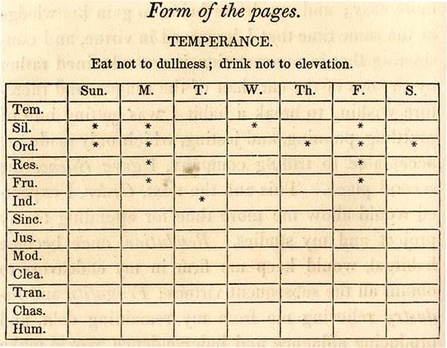|
"While my care was employ'd in guarding against one fault, I was often surprised by another; habit took the advantage of inattention; inclination was sometimes too strong for reason." - Benjamin Franklin
|
Benjamin Franklin's Thirteen Virtues: Tips for Getting More From Ben
Benjamin Franklin called them virtues; I call them values. In the business world you will commonly see them labeled as guiding principles or core values.
By living your values it allows many of your decisions to be made faster, with a higher degree of confidence and with less cognitive effort. The challenge is that all values are not equally embraced. For example, Franklin recognized both industry and chastity as virtues, yet historical records suggest he was much better at embracing the former than the latter.
In an effort to deal with the virtues he found most difficult, Franklin developed the following method:
By living your values it allows many of your decisions to be made faster, with a higher degree of confidence and with less cognitive effort. The challenge is that all values are not equally embraced. For example, Franklin recognized both industry and chastity as virtues, yet historical records suggest he was much better at embracing the former than the latter.
In an effort to deal with the virtues he found most difficult, Franklin developed the following method:
Thirteen Virtues
The first step was Franklin writing down a list of all the virtues he felt would help him better achieve moral perfection. According to Franklin his initial list was of 12 virtues, but then a Quaker friend pointed out that he might want to consider adding ‘humility.' Conveniently this 13th virtue allowed for the second step, where Franklin concentrated on one virtue per week. Given 52 weeks, this meant that four (4) times a year each virtue became the center of attention.
|
"These names of virtues, with their precepts, are:
1.TEMPERANCE. Eat not to dullness; drink not to elevation. 2.SILENCE. Speak not but what may benefit others or yourself; avoid trifling conversation. 3.ORDER. Let all your things have their places; let each part of your business have its time. 4.RESOLUTION. Resolve to perform what you ought; perform without fail what you resolve. 5.FRUGALITY. Make no expense but to do good to others or yourself; i.e., waste nothing. 6.INDUSTRY. Lose no time; be always employ'd in something useful; cut off all unnecessary actions. 7.SINCERITY. Use no hurtful deceit; think innocently and justly, and, if you speak, speak accordingly. 8.JUSTICE. Wrong none by doing injuries, or omitting the benefits that are your duty. 9.MODERATION. Avoid extremes; forbear resenting injuries so much as you think they deserve. 10.CLEANLINESS. Tolerate no uncleanliness in body, clothes, or habitation. 11.TRANQUILLITY. Be not disturbed at trifles, or at accidents common or unavoidable. 12.CHASTITY. Rarely use venery but for health or offspring, never to dullness, weakness, or the injury of your own or another's peace or reputation. 13.HUMILITY. Imitate Jesus and Socrates." |
To track his performance Franklin kept a small notebook. Each day he would mark in the book whether or not he felt that he had successfully embraced the virtue. It was Franklin’s version of the quantified self, using pulp or woven-mold paper and a quill pen to create the excel spreadsheet of the 1700’s.
Tips for Using the Franklin Method
I’m curious whether or not Franklin really felt the need to work on 13 virtues. I think it possible he just wanted to get to a number that split nicely into the 4 quarters of the year. With this in mind here are a few tips to consider when working on your own virtues, values, or principles.
Using Benjamin Franklin’s Thirteen Virtues as well as the tips provided, I hope this short article has given you a few ideas to help increase your productivity and achieve more success. While Benjamin Franklin was not a saint, it is hard to argue with the influence and accomplishments he achieved throughout his life.
- Create Your Own List: here is an exhaustive list you can use to get started. List all of the things you value, then go back through and see if you can pare down and/or combine some terms to capture those things you value most. Don’t worry if you end up with more or less than (13) thirteen.
- Don't Fix What Isn't Broken: just because you might value honesty does not mean it needs to be placed on the list of values with which you struggle. It would be a waste of effort focusing on reminding yourself to have integrity or to be honest in your dealings if this is not a fundamental struggle in your life. In this sense you might benefit from two lists; (1) a list of all of your values and, (2) those values you want to improve.
- Set Your Schedule: assume for a second that you end up with 9 or 14 values, any number that does not conveniently fit into 52. No worries. Undoubtedly some values will be more important or could use more attention than others. Benjamin Franklin admitted humility was a virtue he never seemed to master. Maybe a slight change of method that placed humility into his rotation more than 4 times a year would have helped. There is no good reason a value cannot be listed 2 weeks in a row or have a value addressed only once instead of twice in six months.
- Set a Date to Reevaluate: I find it hard to swallow that at age 20, Benjamin Franklin set virtues he wanted to address and never revisited the matter. While hopefully what you value is not changing every week, I think it normal over a lifetime that as you evolve so will your values. Personally, I revisit the process annually even if only to reaffirm the same values I want to work on over the next year are the same as the prior year.
Using Benjamin Franklin’s Thirteen Virtues as well as the tips provided, I hope this short article has given you a few ideas to help increase your productivity and achieve more success. While Benjamin Franklin was not a saint, it is hard to argue with the influence and accomplishments he achieved throughout his life.







